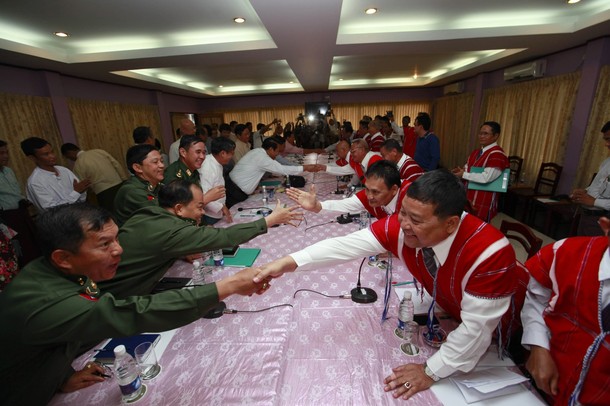It’s not easy to point to any one particular meeting or issue which could be identified as the “breakthrough” during the series of talks, meetings and negotiations that have taken place over the past year. Progress has been sluggish, characterised by mistrust between the government and the ethnic groups on either side of the table. In the meantime, hostilities on the ground only intensified in Kachin and northern Shan states.
Proposals for a framework to implement political dialogue have been labourious, with ethnic leaders insistent that dialogue be agreed ahead of a nationwide ceasefire accord and the government keen to put pens to paper first – then worry about the nuts and bolts later.
Simmering at the bottom of this cauldron was the age-old rallying cry for a federal union, a recognition of semi-autonomy that the Karens, Shans, Kachins and other ethnic groups felt they had been cheated out of back in 1948.
But on 1 December, in his monthly radio address to the nation, Burma’s President Thein Sein announced that a firm political agreement had been reached with ethnic armed groups to establish a federal union in the country.
Then on 5 January, following Independence Day talks between representatives of 12 ethnic armed groups and President Thein Sein and Commander-in-Chief Snr-Gen Min Aung Hlaing in Naypyidaw, word emerged that Thein Sein had assured the delegation of his intention to facilitate a nationwide ceasefire agreement before the end of his term and expressed a wish to sign one by 12 February, the country’s Union Day, commemorating the founding of the Union of Burma in 1947.
But how close are both sides to an agreement? Several crucial issues are yet to be resolved. In addition, the Kachin Independence Organisation and its allies appear further than ever from a truce.
DVB asked several political players their opinions on the prospect for a Union Day ceasefire. We asked them how probable they believed a peace deal would be.
Here are the answers from some of the respondents.
But DVB also wants to hear from you, the readers. What do you think of the likelihood of an imminent nationwide ceasefire? VOTE in our online poll below.
Hkun Okker, Nationwide Ceasefire Coordination Team (NCCT)
“The military commander-in-chief has told us that the army follows the command of the president. However, it is necessary to stop fighting ahead of the nationwide ceasefire signing rather than after, to show a genuine commitment to ending the hostility. Only then there will be an environment that will allow a ceasefire. No matter how much we agree on the ceasefire text, it will be challenging to implement it without the right circumstances. We cannot foretell whether it will actually happen on the Union Day or not but, if we can agree on two basic conditions, there is a possibility.”
[related]
Manam Tuja, Kachin State Democracy Party
“There is a slim chance that the ceasefire agreement will be signed on Union Day. We have said that it would be ideal to include all ethnic armed groups in the nationwide ceasefire accord – leaving just one behind would mean the problems are not completely resolved. Whether the signing happens will also depend on the success of the upcoming talks between the Union Peace-Making Work Committee (UPWC) and ethnic armed groups. But I see that [the ceasefire agreement] is not likely not happen on Union Day, but not only just because of clashes. There are other issues at play.”
Hla Maung Shwe, Myanmar Peace Centre
“After an announcement that the NCCT and the UPWC, led by Aung Min, would hold a meeting in January 2015, we are anticipating an NCCT meeting, currently set for the 19 and 20 of this month – this is fairly close to Union Day. We have also received reports about fighting in Kachin State’s Hpakant. We hope that the hostility will end without escalation, but we need to wait and how it will play out in real life.”
Khin Maung Swe, National Democratic Force
“In my opinion, the conflict may continue as the ceasefire cannot yet be signed. There will be demarcation disputes and territorial expansion, as well as competition to control lucrative business routes, while illegal logging operations by the Chinese continue too. I think clashes will be inevitable until the nationwide ceasefire agreement is signed, so I believe the government will try to make the ceasefire happen.”
Mya Aye, 88 Generation Peace and Open Society
“Honestly, I feel discouraged when the news of the fighting broke. Previously, I thought there was about 75 percent chance of the ceasefire signing taking place on Union Day but now I would say its 50-50. One thing to consider is that, although there is fighting on the ground, there is a chance that fighting will be reduced if leaders from both sides can grow stronger on policy issues. If there are positive outcomes in the seventh round of talks between the NCCT and the UPWC planned ahead of the union day, it’s possible that the ceasefire could be signed on Union Day.”
But DVB also wants to hear from you, the readers. What do you think of the likelihood of an imminent nationwide ceasefire?
Have your say in our poll and discuss the issue in the comments section below.
[polldaddy poll=”8588347″]



